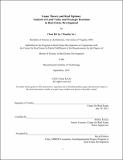Game theory and real options : analysis of land value and strategic decisions in real estate development
Author(s)
So, Chun Kit (Chun Kit Timothy)
DownloadFull printable version (1.708Mb)
Alternative title
Analysis of land value and strategic decisions in real estate development
Other Contributors
Massachusetts Institute of Technology. Center for Real Estate. Program in Real Estate Development.
Advisor
Walter Torous.
Terms of use
Metadata
Show full item recordAbstract
This thesis investigates the use of the game theory and the real options theory in real estate development at the strategic level, trying empirically to explain different economic observations among different metropolitan cities and different property types. The real options theory provides a rich theoretical framework to analyze investment values in real estate development. It takes the market uncertainty into consideration, while the widely used neoclassical NPV valuation method takes a deterministic approach. A simplified real options valuation model is set up in this thesis to calculate the option premium value of waiting for developers. However, since it is done in a monopolistic setting, the strategic interaction aspect of real estate development will be analyzed using the game theory model. The interaction of the game theory model and the real options model will provide a comprehensive and powerful framework to study the timing strategy of developers. Using data spanning quarterly from 1995 to 2013 among 5 property types (single-family house, apartment, industrial, office, and retail) and 44 MSAs, this thesis analyzes the relationships empirically between the volatility of underlying assets, the land cost ratio, the option premium value, and the timing of development. The aims of the study are twofold. First, the study compares different market characteristics among different MSAs and different property types from the option game theoretic perspective. Second, it analyzes the effect and the use of the game theory and the real options theory in the context of real estate development.
Description
Thesis (S.M. in Real Estate Development)--Massachusetts Institute of Technology, Program in Real Estate Development in Conjunction with the Center for Real Estate, 2013. This electronic version was submitted by the student author. The certified thesis is available in the Institute Archives and Special Collections. Cataloged from student-submitted PDF version of thesis. Includes bibliographical references (pages 82-84).
Date issued
2013Department
Massachusetts Institute of Technology. Center for Real Estate. Program in Real Estate Development.; Massachusetts Institute of Technology. Center for Real EstatePublisher
Massachusetts Institute of Technology
Keywords
Center for Real Estate. Program in Real Estate Development.